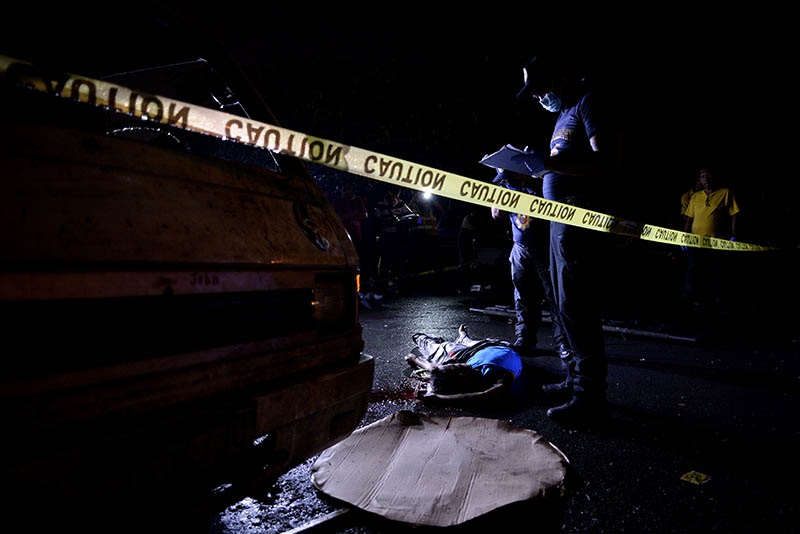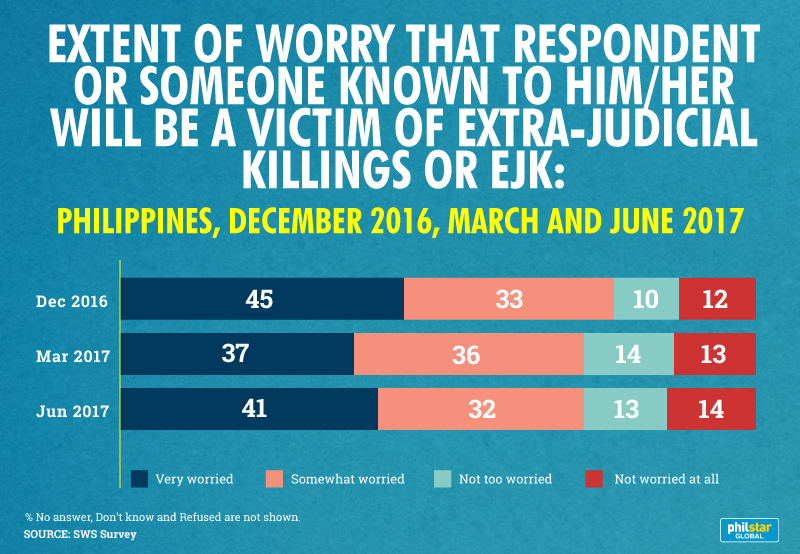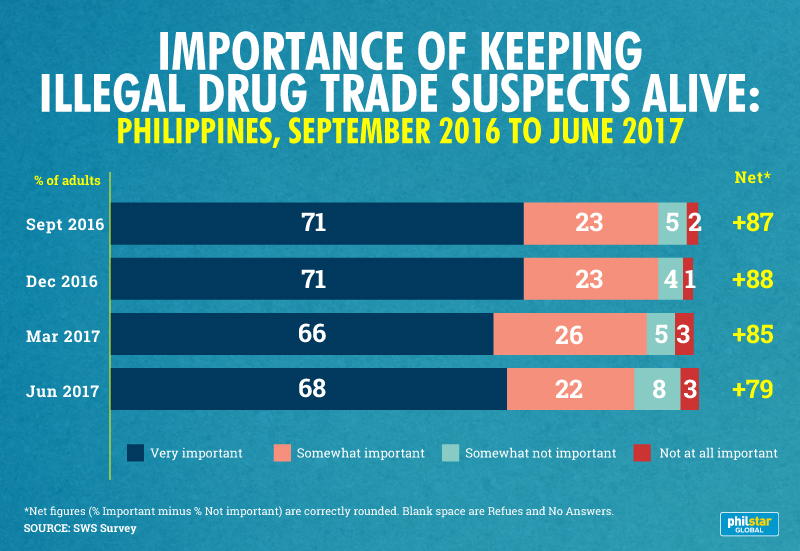PNP: 6,225 drug-related deaths, no extrajudicial killings

According to the Philippine National Police, there have been 6,225 drug-related deaths between July 2016 and September 2017. Despite this, the authorities claim that there has only been one extrajudicial victim under the current administration. AFP/Noel Celis
MANILA, Philippines (Updated 5:21 p.m.) — Filipinos should not be worried for their lives as there has only been one case of extrajudicial killing under the administration of President Rodrigo Duterte, the Philippine National Police claimed.
A "corrected" PNP statement issued Friday afternoon omitted mention of the single case it earlier recognized as an extrajudicial killing — the death of Catanduanes-based journalist Larry Que.
Chief Superintendent Dionardo Carlos, PNP spokesman, said in a report that the earlier figure had been corrected by Task Force Usig, the police unit that handles "extralegal killings" of activists, media workers and foreign nationals.
“The PNP protects every individual’s right to life. To allay or remove their fear, let it be known that under the present administration, there is only one case of extrajudicial killing or EJK for the period July 1, 2016 to September 30, 2017,” PNP said in its original statement.
PNP noted that the possibility of being an EJK victim is “very remote, if we based it on facts and not on impression or perception.”
The statement came as a response the results of the latest Social Weather Station survey, which revealed that seven out of 10 Filipinos are anxious that they, or anyone they know, might become EJK victims.
READ: SWS: Vast majority of Filipinos think drug suspects should be captured alive

The PNP previously said the killing of Catanduanes-based journalist Larry Que was considered an extrajudicial killing.
Catanduanes Gov. Joseph Cua and police officer Vincent Tacorda had been implicated in Que’s case.
Tacorda is the whistleblower who claimed he was ordered by his superiors to kill drug personalities.
He, however, recanted his statement after “serious soul searching.”
Administrative Order 35
During the Universal Periodic Review of the Philippines at the UN Human Rights Council in May, Alan Peter Cayetano — then a senator — argued that only killings that are covered by Administrative Order 35. AO35, which was signed by President Benigno Aquino III in 2012, created the Inter-Agency Committee on Extra-legal Killings, Enforced Disappearances, Torture and Other Grave Violations of the Right to Life, Liberty and Security of Persons.
“Administrative Order 35 signed by then President Benigno Aquino III defined EJKs as the killing of the members or advocates of cause-oriented organizations like labor, environment or media activists resulting in very low number of supposed EJKs in the past administration,” Cayetano said after human rights groups and administration critics characterized drug-related killings as extrajudicial.
READ: Cayetano uses restrictive EJK definition, experts say
But Philippine Alliance of Human Rights Advocates said in May that the strict terminology in AO 35 specifically applies to the cases handled by the IAC, which was tasked to probe clear-cut EJK cases rampant that time.
PAHRA Secretary General Rose Trajano said that the government cannot quote AO 35 because “the general definition of EJKs, even at the international level, is any death sanctioned or with the acquiescence of the government outside the due process or the rule of law."
“What was mentioned in the definition of AO 35 just represents a prioritization of extrajudicial killings that were happening at that time and right now we know that the situation has changed,” Human Rights Commissioner Karen Gomez Dumpit said in an interview at the time.
“Based on the press statement by Professor Philip Alston, UN special rapporteur on extrajudicial executions, during his mission to the DR Congo in 2009, the international law definition of extrajudicial execution ‘encompasses any killing by government forces as well as killings by any other groups or individuals which the government fails to investigate, prosecute and punish when it is in a position to do so,’"CHR spokesperson Jacqueline De Guia also said.
Also PNP: 6,225 drug-related deaths since July 2016
The SWS study also showed that nine out of 10 Filipinos believe it is important that authorities capture drug personalities alive.

As a response, PNP said “the drug suspects who surrendered and arrested alive comprise the approximate 99.98 percent results of the PNP campaign against illegal drugs.”
But PNP said there have been 6,225 drug-related deaths between July 2016 and September 2017.
The police said 3,850 have "died in police operations," suggesting these are drug suspects who engaged arresting officers in shootouts; while the another 2,290 "deaths under investigation," have already been determined to be "drug-related."
READ: PNP: 6,225 drug-related deaths since July 2016
According to the #RealNumbersPH August 29 update, there were 3,811 drug personalities who died in anti-drug operations.
From July 1 to September 30, PNP conducted 71,393 anti-drug operations that resulted in the arrest of 109,090 drug offenders.
However, human rights groups estimate a higher death toll, with some estimates going as high as 13,000 individuals killed in the course of the administration’s anti-narcotics campaign.
“These actions proved that the PNP values the right to life of these unfortunate victims of illegal drug," PNP said.
READ: SWS: Majority of Filipinos think ‘nanlaban’ victims didn’t really fight back
- Latest
- Trending





























